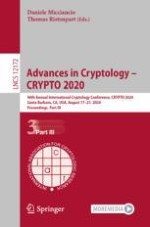2020 | OriginalPaper | Buchkapitel
Private Set Intersection in the Internet Setting from Lightweight Oblivious PRF
verfasst von : Melissa Chase, Peihan Miao
Erschienen in: Advances in Cryptology – CRYPTO 2020
Aktivieren Sie unsere intelligente Suche, um passende Fachinhalte oder Patente zu finden.
Wählen Sie Textabschnitte aus um mit Künstlicher Intelligenz passenden Patente zu finden. powered by
Markieren Sie Textabschnitte, um KI-gestützt weitere passende Inhalte zu finden. powered by
